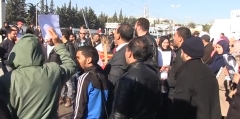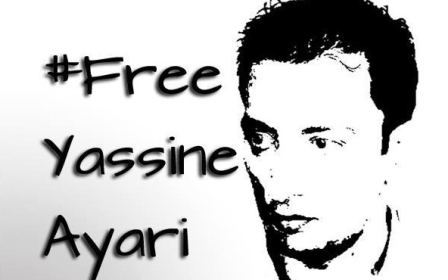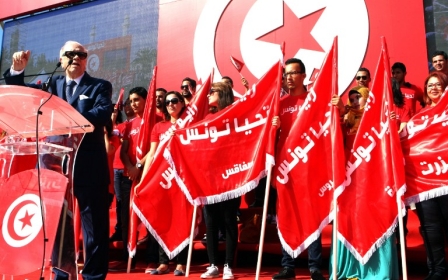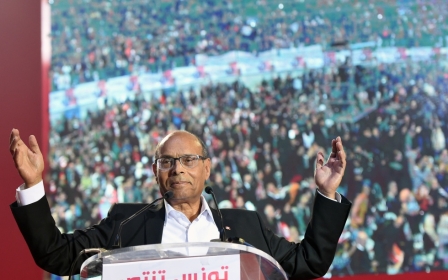Tunisia urged not to try blogger in military court
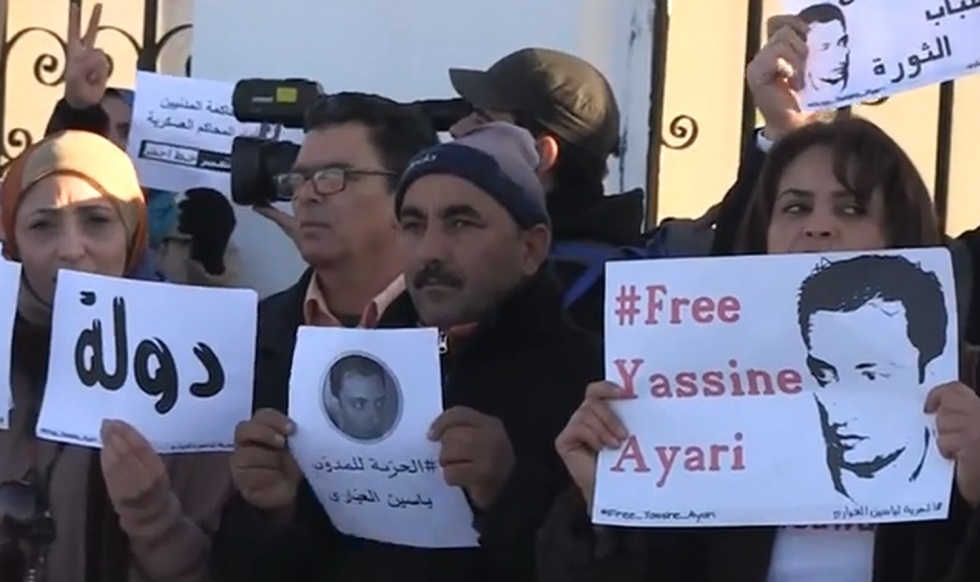
Human rights organisations and campaigners have called on the Tunisian authorities to release a blogger facing a military trial for defaming "army officers and senior defence ministry officials" in his Facebook posts.
Yassine Ayari, 33, was denied bail during a hearing at a military court in Tunis on Tuesday. He was arrested on 25 December upon his return from Paris, after being convicted in absentia on 18 November. The next hearing will be on 20 January.
He is currently being retried after challenging the initial ruling, because he was tried in his absence. He was handed a three-year jail sentence, the maximum term for such a charge.
The trial is over posts on his Facebook page that date from August and September, in which he accused certain army officials of corruption.
Article 91 of Tunisia's military justice code authorises jail punishment for anyone who commits "outrages against the flag or the army, offenses against the dignity, reputation or morale of the army, or acts to undermine military discipline, obedience and due respect to superiors or criticizes the action of military hierarchy or the military officers, offending their dignity."
'Break from the past'
Amnesty International called for Ayari's immediate release from prison, saying that the continuation of his detention is a "gross violation of the right to freedom of expression."
"It is unacceptable that Yassine Ayari has been imprisoned for criticizing state officials. As a civilian, he should never have been tried by a military court and he should be released immediately," said Hassiba Hadj Sahraoui, Deputy Director for the Middle East and North Africa at Amnesty International.
"Tunisia must repeal laws that allow for such prosecutions if it wants to show it is making a clean break from the past," said Sahraoui.
Human Rights Watch also urged the removal of military courts' jurisdiction over civilians.
"As long as such laws [article 91 of the military justice code] remain, those in power can't resist the temptation to silence criticism and dissent," said Eric Goldstein, deputy Middle East and North Africa director at Human Rights Watch.
"The prosecution of persons for defaming the army or other state institutions is incompatible with Tunisia’s obligations under article 19 of the International Covenant on Civil and Political Rights (ICCPR)," HRW said in a press release.
International human rights standards stipulate that civilians must not be tried in military courts, and defamation offences should be dealt with by civilian lawsuits.
'Unconstitutional'
In addition to being seen as flouting Tunisia's international obligations, the military court ruling is also viewed as contradicting the country's own 2014 constitution, which protects the right to free speech.
"I think it is wrong and unconstitutional to try civilians in military courts," Radwan Masmoudi, president of the Centre for the Study of Islam and Democracy, told MEE.
"Military courts should be reserved for crimes committed by military people in uniforms, and not used for trying civilians who criticise military actions or inactions. Freedom of expression should be respected by all, and the military should not be above criticism or scrutiny," he added.
Ayari's lawyer Sami Ben Amor said the charges against his client were "political".
"It is in the interest of Tunisia's new rulers to send a positive message to the people," he said on Tuesday.
Following Ayari's arrest in December, Ben Amor said the case "undermines freedom of speech and is the first of its kind to emerge under the reign of Beji Caid Essebsi," who won Tunisia's presidential election in December, and whose party – Nidaa Tounes – secured the largest number of seats in the country's parliamentary elections in October.
Polarised atmosphere
Ayari's blogs had been very critical of Essebsi and of Nidaa Tounes, while expressing support for Tunisia's former president Moncef Marzouki, who himself has reportedly expressed concern over the blogger's arrest.
But supporters of the Nidaa party point out that the court ruling was prior to Essebsi's taking office, while many of Ayari's political critics have welcomed the jail sentence, further inflaming an already polarised atmosphere.
A number of Facebook pages were set up to campaign for his release, and a Twitter hashtag #Free_Yassine_Ayari is now being revived (since it was first used in July 2013) to call for his release.
Dozens of supporters protested outside the military court on Tuesday, shouting "release Yassine, O judges of El Zine", in a reference to Tunisia's former president Zine El Abidine Ben Ali, who fled the country in 2011 following an uprising against his rule.
"Yassine was defending the military institution, because it - like any other institution – has corruption within. It's not above the law," the blogger's mother, Saida, told Nawaat media outlet.
"We are families who belong to the military institutions", she said, in a reference to the fact that her husband Taher Ayari – Yassine's father – was a colonel in the army, and was killed by militants in May 2011.
"Yassine was calling for reform", she said, adding that her son only wanted to point to where corruption was so that such cases would be addressed, and that he has the support of many in the military.
Freedom of speech
Critics of the military trial fear that with the election of Essebsi, who was part of the country's pre-democracy rule, Tunisia might gradually slip back into dictatorship.
"The deep sate has today resurfaced, as before it was working underground," said Ben Amor on Monday.
Some have been particularly concerned about the right to free speech even before the 2014 parliamentary and presidential elections, during the reign of a national-consensus technocrat government led by Prime Minister Mehdi Jomaa.
"Freedom of speech is under threat," Maryam Mnaouar, head of al-Hizb al-Tounisi (the Tunisian Party), told MEE in September.
"When Ennahda [party] was in power, media outlets were highlighting human rights abuses all the time. But now [during the national-consensus government] people are finding it difficult to report such abuses like before," said Mnaouar, adding that there has been no change in police conduct since the 2011 revolt.
New MEE newsletter: Jerusalem Dispatch
Sign up to get the latest insights and analysis on Israel-Palestine, alongside Turkey Unpacked and other MEE newsletters
Middle East Eye delivers independent and unrivalled coverage and analysis of the Middle East, North Africa and beyond. To learn more about republishing this content and the associated fees, please fill out this form. More about MEE can be found here.


